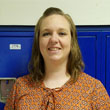 Submitted by Racheal Haley
Submitted by Racheal Haley
8th Grade Science Teacher and Technology Coordinator
Leeds Middle School
Looking back on my first year of teaching, I cringe at how I taught science. I clung to the textbook because it was comfortable and methodical. It was “Here’s what I know. Now write this down so you know it, too.” We didn’t take risks, we didn’t make messes, and we didn’t think outside the book. I “bestowed” my wealth of scientific knowledge upon my children through a myriad of PowerPoints, lectures, and readings, and do you know what happened? The kids didn’t really learn anything. My classes were boring, my kids were not engaged, and there was no spark of energy to drive us to learn more. I was so caught up in teaching vocabulary and science concepts that I missed a million opportunities to teach them how to be scientists.
As educators, we are blessed with the ability to inspire, develop, and change more people than any other profession. In my four short years as a science teacher, I have interacted with over 500 kids who wanted to know more about the world around them. That unfortunate first year, I let down 140 of those kids because I failed to help them experience science. Since then, I have reflected, revisited, and revised just about every practice in my classroom striving to make it better. Thankfully, A+ College Ready arrived at my school just when I needed it most.
I joined the A+ College Ready Cohort in the summer of 2015, and the training inspired me to be a better science facilitator. My trainer showed me that science could be fun and exciting and it didn’t require kids to have all the answers first. Through working with LTF and A+ College Ready, I’ve learned to “Engage first and ask questions later.” Instead of building student machines that can spit out random scientific facts, I am building opportunities for students to engage in scientific practice and construct their own meaning. Instead of correcting them and telling them what they should know, I am helping them reflect on what they have witnessed and bridge the connections they are trying to make. Instead of answering all of their questions, I am helping them design procedures to find out on their own.
I have learned that experiencing science is essential to not only understand it, but also to enjoy it fully. The only students in a science class who will take what you say for face value are the kids who already know it, so you’re not really teaching anyone anything by “telling them how it is”. Instead, devote your energy to getting kids excited about learning science. Allow the kids to explore, encourage them to ask questions, and facilitate their growth as scientific thinkers. Constantly reflect with them and guide them with their next steps. Give them that spark that will help build their knowledge from the inside out and drive them to lifelong learning.

0 Comments on "Engage First, Ask Questions Later: Building Science Knowledge from the Inside Out"